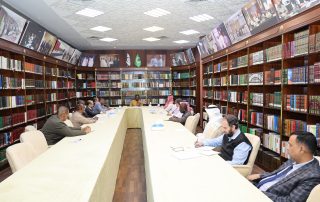
At the invitation of the Mohammed bin Zayed University for Human Sciences in the Emirate of Abu Dhabi, United Arab Emirates, His Excellency Professor Koutoub Mustapha Sano, Secretary General of the International Islamic Fiqh Academy, delivered a lecture entitled: Values of Love in the Holy Quran.
His Excellency began his lecture by expressing his sincere thanks and appreciation to His Excellency Dr. Hamdan Musallam Al Mazroui, Chairman of the University’s Board of Trustees, and to His Excellency Dr. Khaled Al Dhaheri, the University President for his invitation to deliver this lecture as part of a series of religious lectures on the grand values in the Holy Qur’an. He also thanked the faculty members and students for their attendance and active participation.
Then His Excellency spoke about the importance of the topic of the lecture – love-, considering that it is the basis of faith, the key to paradise, the pillar of stability, the pillar of happiness and prosperity. It is ultimately the origin of the relationship between humans and their Lord, and between each other, as there is no happiness, safety, or stability without love.
His Excellency then indicated that the concept of the term love is determined by looking at the beloved and the lover, even if the origin of it is the tendency of the soul to what it sees and thinks it is good for it, referring in this regard to what the predecessors said that there are thirty concepts of love. Then His Excellency explained that the concept of a person’s love for God and His Messenger, differs from the concept of a person’s love for his parents, his children, and for relatives.
He explained that man’s love for God means his obedience to Him, thanks to Him, praise for Him, compliance with His orders and avoiding His prohibitions, while His love for the parents, children and relatives means showing righteousness to them, benevolence to them and making them happy. As for the love of God for man, it means caring for him, preserving him, and protecting him from all harm, as mentioned in the Holy Quran: “And I bestowed upon you love from Me, that you would be brought up under My eye [i.e., observation and care]” Taha: 39.
His Excellency explained that in the Holy Qur’an a noble verse referred to the ranks of love, and the importance of taking it into account when in doubt, which is the Almighty’s saying:
“Say, [O Muḥammad], If your fathers, your sons, your brothers, your wives, your relatives, wealth which you have obtained, commerce wherein you fear decline, and dwellings with which you are pleased are more beloved to you than Allah and His Messenger and jihād [i.e., striving] in His cause, then wait until Allah executes His command. And Allah does not guide the defiantly disobedient people.” At-Tawbah: 24.
Many scholars and researchers wrongly misinterpret this verse as a warning and a rebuke, but a closer look at it reveals that it refers to the levels and types of love and is a clear legislation that the Muslim should refer to in order to differentiate between the types of loved ones. In fact, the verse acknowledges two types of love: An innate and natural love, and the second is an optional and acquired love, and the verse shows the types that fall under the first type of love, namely: love of origins (fathers and grandfathers), love for off springs (children and grandchildren), love for the first kinship (brothers and sisters), love for spouses (in-laws) and love for the clan (Tribes and human society), love of money (in-kind and cash), love of professions (trade, agriculture, and industry) and love of dwellings (homes, villas, and palaces).This love is natural and innate in us, we do not learn it but rather we learn how to tame it and make it moderate. As for the second type of love, it is represented in the love of God, the love of His Messenger, and the love of jihad [i.e., striving] for the sake of God. This kind of love is optional and acquired because a person acquires and chooses it through his struggle and hard work.
Therefore, this love is the one that must come before all kinds of love, in the belief that it is love for the greatest and most beloved. More precisely, if any love conflicts with this love, then it must be preceded unreservedly, as is the case in the obligation to put first the love for God over the love for our parents, children, wives, wealth, professions, and business.
His Excellency then mentioned that the Holy Qur’an called upon the believers to acquire the love of types of good deeds and actions that would increase their feelings of happiness, security, and stability. We find them especially in the love of repentance (he loves the repentant), the love of piety (he loves the pious), the love of justice (he loves the just), and the love of purity (He loves the purified ones), the love of patience (he loves the patient), the love of trust (he loves those who trust in Him), and the love of charity (he loves the benefactors).
His Excellency touched on highlighting the integral relationship between love and affection on the one hand, and between love and cordiality on the other hand, as he emphasized that affection is higher and more general than love, as affection is an advanced stage of love if it is mixed with tenderness, compassion, and mercy then it becomes affection. As a result, the Beloved is not one of God’s names but the Compassionate is, which affirms that affection is greater and higher than love. Therefore, every affection is love, and not all love is affection. The noble Lord, moreover, urged that the relationship between the spouses should rise to the stage of affection and mercy given the importance of this relationship as the cornerstone of society.
His Excellency added that God the Almighty indicated that the ideal relationship that should prevail among the followers of what is known today as the Abrahamic religions should be affection rather than love, a confirmation of the value of affection and its importance for happiness, stability, security, and safety for all humanity.
At the end of his valuable lecture, His Excellency reiterated his call for researchers and scholars to give more attention and care to the topic of love in the Holy Qur’an and the Noble Sunnah, in order to enable the young generations to absorb its complex meanings, understand its themes, and ultimately acquire its values.
Finally, His Excellency Dr. Hamdan Musallam Al Mazroui deeply thanked the honorable speaker and made a distinguished comment on the lecture, in which he and added another type of love which is the love for our homeland and the love and obedience to our rulers.
The lecture was well received and welcomed by the participants.
Read Also
Lastest








